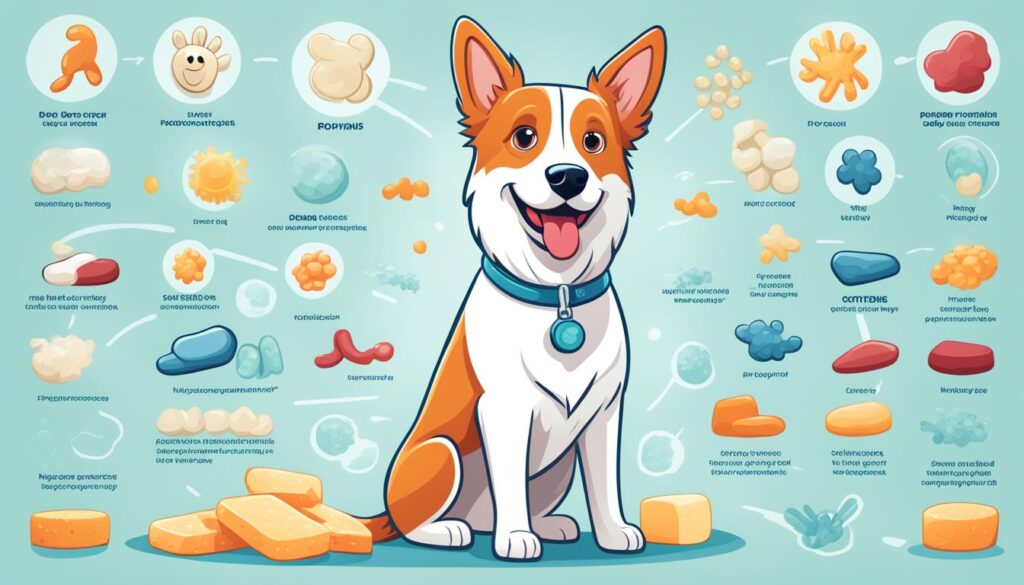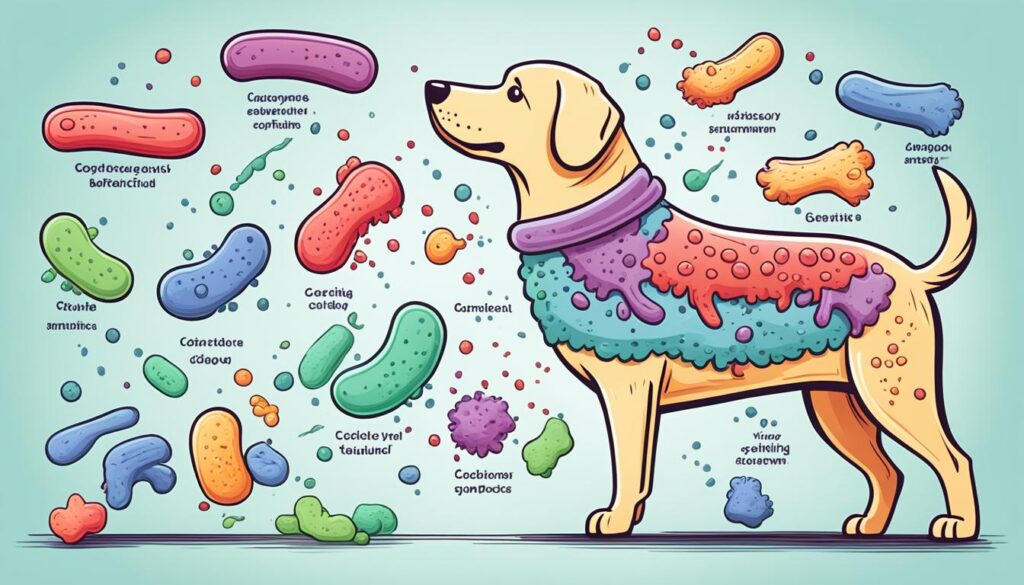Gut Health for Dogs: The Microbiome Connection

Did you know that the digestive system of a dog plays a crucial role in their overall well-being? It’s true! A surprising fact is that a dog’s gut microbiome, a collection of microorganisms in their digestive system, has a significant impact on their energy, immunity, and mental wellness.
Understanding the importance of proper nutrition and gut health is essential for ensuring your furry friend’s overall health and wellness. By nurturing their gut health and maintaining a balanced microbiome, you can help your dog thrive.
Key Takeaways:
- Proper nutrition and gut health are vital for a dog’s overall well-being.
- The gut microbiome influences a dog’s energy, immunity, and mental wellness.
- A healthy gut leads to higher energy levels and better digestion.
- The condition of a dog’s skin, coat, and immune system is closely linked to their gut health.
- Signs of poor gut health in dogs can include digestive issues, skin problems, and lethargy.
What Does a Healthy Digestive System Look Like for Dogs?
In order to maintain a healthy digestive system, dogs need to achieve a balance in their gut microbiome. The gut microbiome is a complex mixture of microorganisms that reside in the digestive system, and it plays a crucial role in a dog’s overall health and well-being.
The gut microbiome is influenced by a dog’s genetics and adapts over time based on their lifestyle and diet. One important aspect of a healthy gut microbiome is the presence of good bacteria. These beneficial bacteria help break down food and promote efficient nutrient absorption, allowing dogs to get the most out of their meals.
One of the telltale signs of a healthy gut is the consistency of a dog’s stool. A dog with a healthy digestive system will have firm and regular stool, indicating proper digestion and absorption of nutrients. On the other hand, loose or watery stool may indicate an imbalance in the gut microbiome and potential nutrient malabsorption.
A healthy gut microbiome also has a direct impact on a dog’s energy levels. When the gut is functioning optimally, dogs are able to extract the necessary nutrients from their food, providing them with the fuel they need to stay active and energized.
Overall, maintaining a healthy digestive system is essential for a dog’s overall well-being. By promoting a balanced gut microbiome and supporting proper nutrient absorption, dogs can enjoy the benefits of optimal energy levels and nutritional health.
The Link Between Gut Health and Skin/Coat Condition
A dog’s gut health plays a vital role in maintaining the condition of their skin and coat. A healthy gut microbiome contributes to the overall health and appearance of your furry friend’s skin and coat. Dry skin, excessive shedding, itching, and a dull coat are all potential signs of an imbalance in the gut.
Proper nutrition is key in supporting a healthy skin and coat in dogs. Including ingredients such as salmon oil, which is rich in omega-3 fatty acids, can improve the condition of their coat and reduce skin dryness. Vitamin E is another beneficial nutrient that promotes skin health, while flaxseed provides essential omega-6 fatty acids that help reduce itching and inflammation.
To enhance your dog’s skin and coat health, consider incorporating these ingredients into their diet or choosing pet food that contains them. Providing essential nutrients through their diet can help alleviate dry skin, itching, and promote a shiny, lustrous coat.
Benefits of Salmon Oil, Vitamin E, and Flaxseed for Skin and Coat Health
| Ingredient | Benefits |
|---|---|
| Salmon Oil | Rich in omega-3 fatty acids that promote healthy skin and a shiny coat |
| Vitamin E | Supports skin health and helps reduce inflammation and itching |
| Flaxseed | Provides essential omega-6 fatty acids that contribute to a healthy coat and alleviate itching |

By prioritizing your dog’s gut health and including these beneficial ingredients in their diet, you can help maintain their skin and coat in optimal condition. Remember to consult with your veterinarian to ensure their dietary needs are met and to address any specific skin or coat concerns your pet may have.
The Importance of a Healthy Gut for Immune System Function
Optimal gut health plays a crucial role in supporting a strong immune system in dogs. The gut microbiome, a diverse community of microorganisms in the digestive system, has a direct influence on the immune system’s effectiveness. By maintaining a healthy gut, dogs can better defend against harmful infections and diseases.
A well-balanced gut microbiome supports immune cell production and regulates the body’s inflammatory responses. On the other hand, poor gut health can disrupt the immune system, leading to increased susceptibility to illnesses and chronic inflammation.
One way to promote a healthy gut is through proper nutrition. Choosing high-quality pet food that contains essential nutrients, like veggies, superfoods, and proteins, can help optimize gut health and enhance the immune system’s functionality.
The Gut-Immune System Connection:
“A robust immune system starts with a healthy gut.”
A healthy gut microbiome provides several benefits for the immune system:
- Improved Defense: The gut microbiome helps activate immune cells that identify and fight off harmful pathogens, enhancing the body’s natural defense mechanisms.
- Reduced Inflammation: A balanced gut microbiome helps regulate the body’s inflammatory responses, preventing chronic inflammation that can lead to various health issues.
- Enhanced Gut Barrier: A healthy gut lining acts as a protective barrier, preventing harmful bacteria or toxins from entering the bloodstream and triggering immune responses.
By focusing on gut health, pet owners can significantly contribute to their dogs’ overall well-being and minimize the risk of immune-related illnesses.
The Gut-Immune System Relationship:
| Gut Health | Immune System |
|---|---|
| Optimal gut microbiome | Strong immune system function |
| Poor gut health | Increased susceptibility to illnesses and diseases |
| Imbalanced gut microbiome | Chronic inflammation |
Investing in your dog’s gut health is essential for promoting a robust immune system. Along with providing high-quality pet food, consulting with a veterinarian and considering probiotics can further enhance gut health and support your dog’s immune system.
Understanding Dysbiosis and Signs of Poor Gut Health in Dogs
Dysbiosis is a condition characterized by an imbalance between beneficial and harmful bacteria in a dog’s gut. When this imbalance occurs, it can lead to various digestive issues, inflammation, and other health problems. It’s essential for dog owners to be aware of the signs and symptoms of poor gut health, as early detection and intervention can help address these issues effectively.
Some common signs of poor gut health in dogs include:
- Diarrhoea: Frequent loose or watery stools can indicate an imbalance in the gut microbiome.
- Constipation: Difficulty passing stools or infrequent bowel movements may suggest gut imbalances.
- Excessive gas: Dogs with excessive gas or flatulence may be experiencing gut dysbiosis.
- Vomiting: Recurrent vomiting can be a sign of an unhealthy gut and digestive system.
- Loss of appetite: A diminished desire to eat or sudden disinterest in food may be linked to gut issues.
- Lethargy: Dogs with poor gut health may appear lethargic or lack energy.
- Itchy skin: Skin irritations, itching, or hot spots can be indicators of gut imbalances.
- Poor coat condition: A dull, dry, or unkempt coat may be a reflection of an unhealthy gut.
If you notice any of these signs in your dog, it is crucial to consult a veterinarian for a proper diagnosis and guidance on improving gut health. A veterinarian can recommend appropriate dietary adjustments, probiotics, or other treatments to restore a healthy balance in the gut microbiome.
Early detection and intervention are key in addressing gut health issues in dogs.
By addressing dysbiosis and promoting a healthy gut, you can help improve your dog’s overall well-being, digestion, and quality of life.

Conclusion
Nurturing your dog’s gut health through proper nutrition and the use of probiotics is essential for their overall wellness. A healthy gut microbiome promotes optimal nutrient absorption, energy levels, skin and coat health, and a strong immune system. By keeping a close eye on your dog’s stool, eating habits, behavior, and overall health, you can detect any signs of gut health issues and take appropriate actions.
When selecting probiotics for your dog, prioritize strain diversity, colony-forming units, and check the expiration date. Optimal gut health can be achieved by incorporating a balanced diet, natural fiber sources, and probiotics into your dog’s routine. A well-maintained gut contributes to your dog’s overall well-being, ensuring a happy and healthy furry companion.
Remember, the gut microbiome is a key player in your dog’s digestive system and overall wellness. By prioritizing your dog’s gut health, you are taking an important step towards their long-term health and happiness. So make sure to prioritize their gut health through proper nutrition, regular observation, and the use of probiotics for a thriving pet.
FAQ
Why is gut health important for dogs?
Gut health is important for dogs because it plays a crucial role in their overall well-being. The gut microbiome, which is a collection of microorganisms in the digestive system, affects a dog’s energy levels, immunity, and mental wellness.
What does a healthy digestive system look like for dogs?
A healthy digestive system for dogs involves achieving a balance in their gut microbiome. Good bacteria in the digestive system help break down food and promote nutrient absorption. Signs of a healthy gut include firm and regular stool, indicating proper digestion, and higher energy levels in dogs.
How does gut health affect a dog’s skin and coat condition?
There is a strong connection between a dog’s gut health and the condition of their skin and coat. A healthy gut microbiome contributes to healthy skin and a shiny coat. Dry skin, excessive shedding, itching, and a dull coat may indicate an imbalance in the gut. Choosing pet food with ingredients like salmon oil, vitamin E, and flaxseed can help improve the coat condition by providing essential nutrients.
Why is a healthy gut important for a dog’s immune system?
Optimal gut health is crucial for a strong immune system in dogs. A healthy gut microbiome helps prevent harmful infections and supports immune cell production. Poor gut health can lead to digestive issues, inflammation, and increased susceptibility to illness and disease. Choosing pet food that contains veggies, superfoods, and high-quality proteins can help improve gut health and boost the immune system.
What is dysbiosis and what are the signs of poor gut health in dogs?
Dysbiosis occurs when there is an imbalance between the beneficial and harmful bacteria in the gut. This can lead to digestive issues, inflammation, and other health problems in dogs. Signs of poor gut health include diarrhea, constipation, excessive gas, vomiting, loss of appetite, lethargy, itchy skin, and poor coat condition. It is important to pay attention to these signs and seek veterinary advice to address gut health issues.
How can I nurture my dog’s gut health?
Nurturing your dog’s gut health through proper nutrition and the use of probiotics is essential for their overall wellness. A healthy gut microbiome promotes nutrient absorption, energy levels, skin and coat health, and a strong immune system. Regular observation of your dog’s stool, eating habits, behavior, and overall health is important to detect any signs of gut health issues. When choosing probiotics for dogs, look for strain diversity, colony-forming units, and the expiration date. Boosting your dog’s gut health can be achieved through a balanced diet, natural fiber sources, and the use of probiotics.